1163 Eleven poets from a plague year
Ten steps back to the garden: a poetic guide to recovery
by Linda Rogers
*
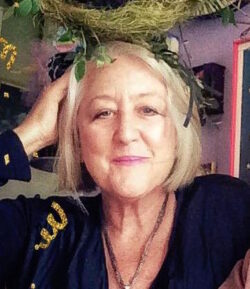
A blooming branch has emerged from the dark age of lockdown for review, and as we cut the weeds growing around the stone steps into the garden, we are left to consider the moon phases we have endured, the brutal pruning and the rampant beauty of fresh growth. Together these books lead us to a fresh understanding of how and what we are enduring as individuals and as a society and what we might hope for.
Just as there are Stations of the Cross and steps to sobriety, there are stages of grief by which we trace our return to health. Poetry in this review constitutes the bread of angels, wafers that offer strategic coping with loss and restoration of strength, step by step, not to the church door where the God of Mammon lures little children to ignominious death, but to a forest portal, where Vancouver poet Colin Browne reveals:
i’ve found a book conceived
before the recent darkness
utopia without question marks
“the chain of memory”
“The house of Life”
As we shred our hugging curtains at the end of the plague that has divided us physically and politically for longer than we can, as a species, be expected to bear, holy human communion being the most blessed sacrament, we are left wondering.
How have we got here? How do we erase the sins that brought civilisation to its knees, the greed and excess that ruins the garden we plant with questionable progress, silos of privilege?
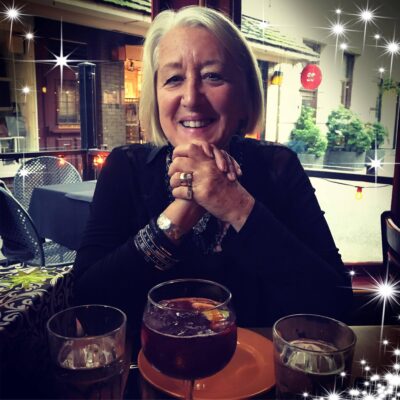
Desperately, we have considered war, ultimate social Darwinism, survival of the fittest, Boomer Remover, peace, legislation of the gospel of need, to each his own, and ultimately science, the miracle cures. Some pray to God and/or Mammon. Others resort to blaming blood-sucking sub genres: thugs, Jews, women. Always, always, misogyny is at the root of bigotry as men resent and resist the mother wound, which if they listen, they will find out is benign holes in the ground, places to seed and not the repository of contagion.
Ever since Eve got hungry for something more nourishing than sex with her narcissistic mate, women have been blamed for everything and so we see authoritarian governments choosing to curtail women’s rights as opposed to safeguarding health.
During our time of Exile from each other, many have turned to the garden that is poetry, secular prayer, real dialogue, free of the perversion of good that undermines religion, the arrangement of words that constitutes new laws based on the best of the old, do unto others…
In the behavioural patterns that have brought us to many simultaneous moments, hope, grief, baking, gardening, hoarding and generosity, many have found comfort in language that lifts us out of despair and on our climb to the shining city on the hill, where we hope to live in harmony with nature and with one another.
This is a testament with ten holy tablets, ten stones on a path that could lead us back to the alpine meadow of restored innocence. — Linda Rogers
*
Step 1. Fear
eat salt | gaze at the ocean
by Junie Désil
Vancouver: Talonbooks, 2020
$17.95 / 9781772012651
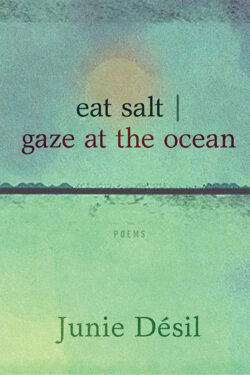 This poet, daughter of the African Diaspora, a perilous flood, insists, “we still need to talk about the ocean.” Division is the primal wound. Remembers Moses dividing the Red Sea, blood. We are mostly water, but what flows is not always benign. For African descendants in the Americas, the sea, tainted with ancestral blood, the amniotic fluid of slavery, is more than fear of drowning in islands of plastic and acts of god. Their cotton triangle is the shape of fear.
This poet, daughter of the African Diaspora, a perilous flood, insists, “we still need to talk about the ocean.” Division is the primal wound. Remembers Moses dividing the Red Sea, blood. We are mostly water, but what flows is not always benign. For African descendants in the Americas, the sea, tainted with ancestral blood, the amniotic fluid of slavery, is more than fear of drowning in islands of plastic and acts of god. Their cotton triangle is the shape of fear.
these fleshy ghosts birth me i want to tell you that the primal
sea rocked me he womb a ship’s hold reproduced in wood
and iron shackles — there is no pastness

As lunar tides change with the moon, in a constant rhythm of fear, there is no hesitation as words flow from one anxiety to the next, the only relief being love, constantly under assault from “this constant familiar uneasiness.”
In her circular poem, “how to talk about zombies without resorting to magical thinking” and the concrete idiosyncrasies of her text, she insists on removing us from the reality on non-engagement. We are compelled to ride the wave as water educates the sand of time.
She reprises artefacts from slave uprisings in Santa Domingo, sister to Haiti, where her soul was born in this generation of a long and bloody exodus. It is comforting to know a sugar-planting ancestor of the brown great-grandchild I hold in my arms, descendent of another colonial Diaspora, had his head bashed in by a slave. Now we struggle in the same tide, blessed in the blood of a million souls.
intermediary between no home un-home what’s home
and ocean-cradled souls
So often we ask ourselves how we can walk in another’s shoes in order to understand the degrees of separation that are forced on us. It is not really about shoes. Shoes are a destination, inertia made from the skins of animals who die for us. Not their choice.

By removing punctuation, historical signature of her publisher, the poet invites her readers to inhabit not just her shoes but her very skin as she gets naked and vulnerable in poems that tell not only her story but the story of millions before her. Just as zombies move between realities, phenomenal lives and magical thinking, so are we invited to join the transit of molecules that make up our mitochondrial blanket of tangled roots, and the water that is seventy percent of living organisms.
i stare at the ocean and wonder
when I will feel alive
The dead souls, her Haitian ancestors brought across the sea in chains, call back. She resists the urge to join them and join her tears with theirs even as she promises to carry their stories on her back as she rides the whale in the room. Racism is ALIVE. It is time to sink or swim for survival, and this collection is swimming lessons on dry land as we absorb them during lockdown.
*
Step 2. Social Distance
Strangers
by Rob Taylor
Windsor, ON: Biblioasis, 2021
$19.95 / 9781771964197
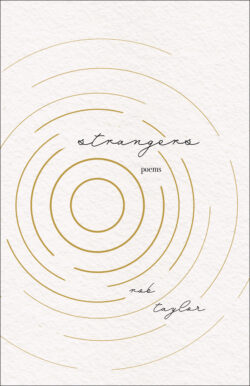 Six feet, eight feet, a lifetime. There are so many degrees of separation, vascular highways stretched between them. The truth is, plague, even death cannot serve to sever the veins of communication, so long as we have memory, so long as
Six feet, eight feet, a lifetime. There are so many degrees of separation, vascular highways stretched between them. The truth is, plague, even death cannot serve to sever the veins of communication, so long as we have memory, so long as
He was your poems.
He was waving and becoming larger.
“Don’t be a stranger,” we say to friends and relatives who have ghosted us or moved far away. Sometimes we say it to the dead, as in “soul come back” when we sneeze.
To myself, I realise, my mind half waking
From the dream. I am my only rescue.
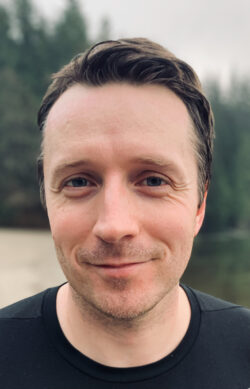
Rob Taylor has had his share of grief and that informs his anxiety, which comes in little frames of grief, amuse bouches without the amuse. The poems are kisses though, like the ones planted on sleeping beauty out for the count and destined to be awakened by love. Every poem reaches into sleep, whether it is death or the unconscious child, lost in another reality.
Quiet is the air relaxing its arms, Sleep is joy
And practice, how you learn to let things come.
The poet resists sleep as a child does. Giving up control of his dreams is a hard thing to do, he testifies. Some poets can work with distraction. Others require the dead of night, the strangeness of living in the dark and feeling/remembering the way back to the heart when eyes and ears are poor navigators, taking him only to fear.
The poems Taylor wrote at the Purdy A-frame on Roblin Lake are an interesting example of spirit wrestling. There was no doubt the dead poet overwhelmed everything that fell under his large shadow: his friends, his family everything but the landscape that gave birth to him. Taylor could not have known Al, but this writer will witness that his presence is still bigger than the house he and Eurithe made out of bits and pieces picked up on their sound walks through the countryside.
In these poems Taylor sounds overwhelmed, not by the sound of his own anxious heart, the past beating genetic recognition, but by the voice of another ghost. And standing beside the book-shaped gravestone my husband designed, The Voice of the Land, intimidating in death, he writes,
Thank you, Al, for the A-frame, the poems,
this anchor you dropped by the millpond.
for ferrying nothing, not one blooming word,
with you across its black eye.
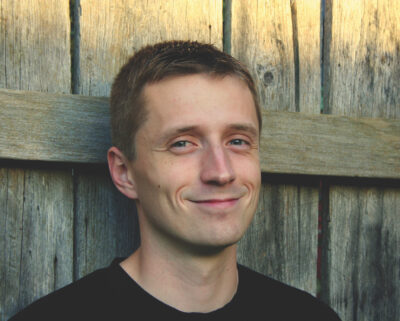
Which is as it should be because poets, better than anyone, know how to be strangers, witnesses. It is our defence against the isolation of contagion. Business as usual, the business of listening
till I hear, eventually my heart
outside arriving as a stranger.
Pandemic, we realise is all grief, memory bound up with fear of future loss. This is the book that reminds us of the steps in finding coherence in fear. “Don’t be a stranger” the poet reminds himself and us as life slips through our fingers as every one of his fresh and vital poems reminds us of the firm grip of the newborn.
*
Step 3. Grief
Grey All Over
by Andrea Actis
London, ON: Brick Books, 2021
$22.95 / 9781771315395
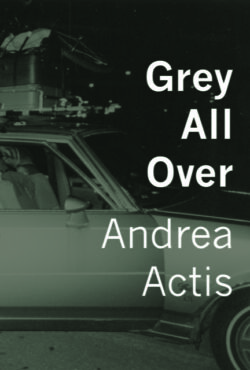 I once read a note on a file from Brick that said, “These poems are not deeply felt.” How surprising when we know all poetry is naked, not the least Andrea Actis’s maiden opus, a harrowing voyage into grief that goes deeper even than howling.
I once read a note on a file from Brick that said, “These poems are not deeply felt.” How surprising when we know all poetry is naked, not the least Andrea Actis’s maiden opus, a harrowing voyage into grief that goes deeper even than howling.
This book, dealing with primal relationships and primal wounds, edited by “Queer specialist” John Barton, is dictated from the sub-sub-conscious where feeling and language meet for the first time and the manifest is confusion, addiction, mourning as a vulnerable being struggles to find the words to describe loss.
Grey is the colour of depression and the veil that comes over Vancouver, the saltwater city of tears and longing surrounded by glorious mountain peaks, the unattainable summits beyond the reach of souls lost on beaches frequently overwhelmed by fog as are prose poems struggling for fresh air. It is easy to get lost in a climate that promises sunshine and rain and when those life-giving prophecies too often turn grey.
The narrator dedicates her book of mourning, “For my dead dad,” to the man she found unresponsive in her bed, and what follows is a catalogue of dysfunction, memory informed by phenomenal objects that offer testament to inverse parenting, the flesh connections that strangle a poet struggling to surface.
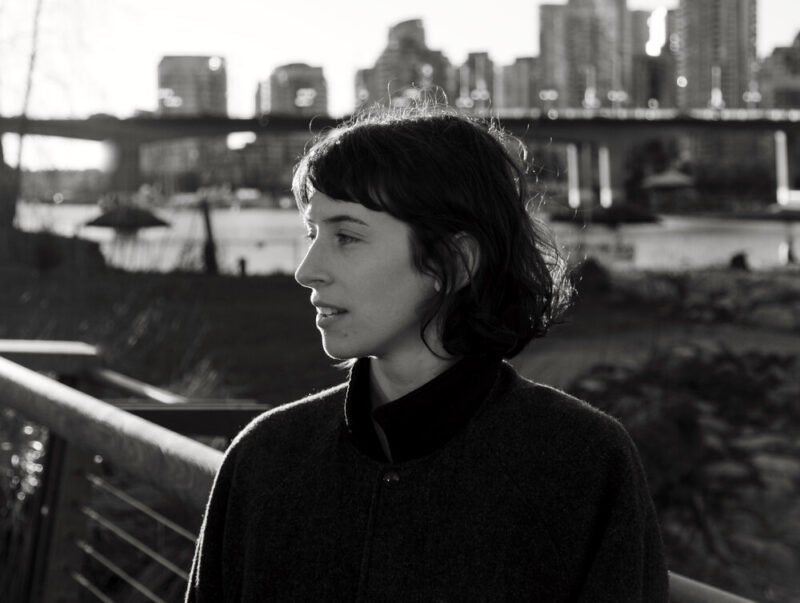

In the Sensation show at the Tate Museum two decades ago, Dead Dad, a tiny man with a shrivelled penis by sculptor Ron Mueck, begged similar reaction. He was made with love but, lying flat on the floor, he was no nurse log, no decomposing parent nourishing future trees.
The poet acknowledges that her dances with family deficit and persona adjustment to rage and her sister jealousy had rendered her speechless, and death brought at once grief and relief.
To be honest, this is the first time
I’ve written a poem and been
able to hear myself saying something inside of it.
I’m listening to my own
exactitude take shape.
Her book is testament to the proclamation of the prophet Isaiah. “When the father eats sour grapes, the son (or daughter’s) teeth are on edge.” This is the twisted sacrament she describes.
Dad was back and thankfully ate all the accumulated panettone,
even though it was summer and I didn’t have anything except Earth
Balance to put on it. He tried to tell me that lie again about how when
a giraffe sits down it cannot ever get up without having a heart attack.
She calls her mixed blessing, death in birth, soul ash as she struggles with the mark on her forehead and an extended period of lamentation. Her suffocating caul is a combination of genetic and environmental factors: addiction, sexual identity, the world. Her journey works backwards through trauma, a litany of clerical errors that are evidenced in telephone transcripts, photos, diary notes and empty bottles, pills, and booze.
All the while her text is sub-text, arguments with herself, her parents and the ever present editor invigilating a time of loss, which with its publication parallels a time of extreme social loss, where holes in the ground wait everywhere to trip or bury us as the multiple pandemics: plague, bigotry, and global warming reach out of the ground to grab our souls, as many succumbing to mental illness as contagious disease.
This is one step on the way to wellness, since it is necessary to confront the perils that lurk in the colour grey as we slowly work our way to the light.
*
Step 4. Learning New Languages
The Language We Were Never Taught to Speak
by Grace Lau
Montreal: Guernica Editions, 2021
$20.00 / 9781771835879
 When the terroir is familiar, we speak without hesitation, looking for shadows and obstacles. Grace Lau crossed another unfamiliar ocean as a child, one that brought her ancestors to indentured labour and head tax, another other form of slavery, and a foreign language.
When the terroir is familiar, we speak without hesitation, looking for shadows and obstacles. Grace Lau crossed another unfamiliar ocean as a child, one that brought her ancestors to indentured labour and head tax, another other form of slavery, and a foreign language.
That is in the language of her DNA, again under assault as racism thrives in the matrix of fear surrounding a plague that may have been MADE IN CHINA or come from eating bats, or experimentation with bats in Wuhan laboratories.
The child of colonial religion, her father a preacher, she has on her skin the marks of alienation, her ethnicity and her sexual orientation, anathema to fundamentalists. That is two massive waves in the swim for survival. Confronted with racism from without and judgement from within a religious family, her first book of poems translates one response to invisible plagues in her doctrine of self-knowledge, so that when the virus attacks she is not immune but, like tempered steel, ready to resist.

You will learn that
the salt of your tears is necessary to
survive,
It feels like you are drowning
you will
rise.
Like the moon shaped wounds she made on the palms of her clenched fists, she will heal because she has learned the canticles of survival taught by the rhyming of the sea that brought her ancestors to servitude and herself to a greater freedom, the truth about herself. Lau is neither East or West but her own wondrous hybrid, a woman with a voice inherited from her father, but not the same.
Now, when I call upon my voice,
I tell it this;
Let them hear
Me. I am
my father’s daughter.
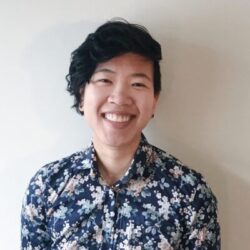
Ripe with intention and embroidered with the tiny pinpricks of pain, her language, the one she discovers alone in the dark, where we have all been left for so long, is naked, free of ballast as a sinking ship that does not sink but sails into the next sunrise, truth.
And the truth during and after pandemic is the same as before, what we all can access if we answer the call to self-reflection is best expressed in carefully chosen words,
as if my skin remembers
its spring song, no longer
a young and dying thing
but at last,
winged.
*
Step 5. Occupational Therapy
The Wig-Maker
by Janet Gallant & Sharon Thesen
Vancouver: New Star Books, 2021
$18.00 / 9781554201716
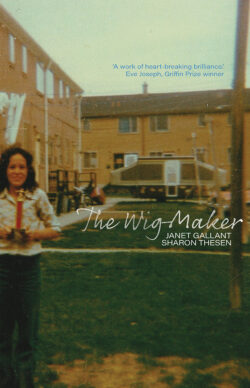 There are so many ways of telling our stories. For women, it is rarely the megatrope, a muscular challenge, earth heaving, sky falling in, the sound of a speeding bullet. Because of our mandate to repair the hive, keep the world humming no matter what, because there are children to love and protect, we tend to thread the needle, dip the pen in ink and quietly get to work.
There are so many ways of telling our stories. For women, it is rarely the megatrope, a muscular challenge, earth heaving, sky falling in, the sound of a speeding bullet. Because of our mandate to repair the hive, keep the world humming no matter what, because there are children to love and protect, we tend to thread the needle, dip the pen in ink and quietly get to work.
That is exactly what opportune friends, neighbours Janet Gallant and Sharon Thesen, decided to do with Gallant’s narrative of grief. Over cups of coffee and glasses of wine, they knotted the threads that restored a garland of glory where Gallant had been allotted a crown of thorns, a childhood so dysfunctional, so traumatic, her hair fell out.
While fires raged around them in the summer of 2017, they stitched a compelling narrative. Unlike Penelope, who wove and undid her weaving to secure a lie, they are the truth tellers because these are times that demand accountability from a system that allows, even encourages, children to suffer.
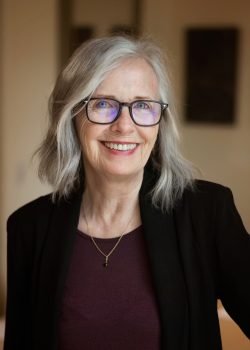
The needle pricks. There is pain in healing, but the two women are relentless in finding the truth that will make them free, both witness and victim because what oppresses one woman oppresses all.
Mental illness is shared by nature and nurture. The only cure is love. In the end, there will be peace, a wig and a scalp that is a map of the scars on a wounded family and the family of man and womankind.
Thesen’s word map is drawn from direct dictation. She does not embellish the flat narrative with coloratura ornaments, the gifts of a lyric poet. Both the telling and listening require absolute integrity as she describes her friend’s mother wound,
Now I understand where the names come from
I know which slave owner owned us
but I didn’t know my mother.
Just as the wig maker’s work is quiet and persistent, so come the questions and answers that quietly take shape in the text of the book. Less howls than moans, they weave a song of the oppressed. This is the sound of slaves in cotton fields and underground railroads, a rumble, the earth moving with enormous effort.
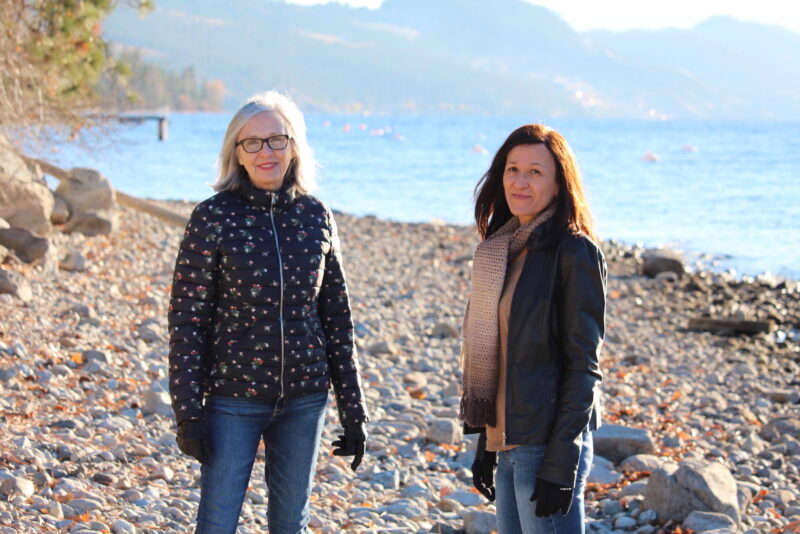
Thesen, the witness, never intrudes with the obvious judgements to bludgeon their readers. It is not her story, but she bears it with respect and caution. When the Earth moves, she covers her head. We must decide what it means to be human, what every human being requires.
For this story I would add the person whose wig making
and remembering and researching was revealing not only
her genetic identity but the spiritual energies of her life
as both victim and survivor.
What emerges is the portrait of a woman who, like buried seed, grows out of the compost of lost hair, a lock from her brother who hung himself, one from her sister destroyed by sorrow and the frightening fallout from her own alopecia, to weave a new rope, not for hanging strange fruit but for the lifeline that might take her to safety.
Braiding her siblings was her experience of love, and so she weaves their stories together. Ubuntu, stronger together. The safety she secures is not to shout about. It is not victory, but it could be a moan of satisfaction, when “aint gonna study war no more” is almost peace, if only with oneself.
*
Step 6. Plague Diary
Pandemic Poems
by Philip Resnick
Vancouver: Ronsdale Press, 2021
$17.95 / 9781553806448
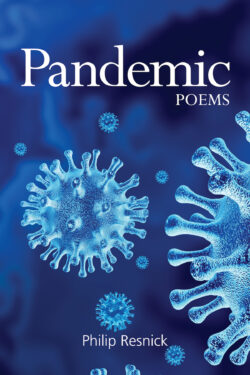 The best seller made up by an earlier patriarchy to protect the status quo still dictates to the current one. “To everything there is a season,” says nothing about science, just the pure belief that we can trust the Dad upstairs to fix our little mistakes. Everything goes round, all the Biblical plagues.
The best seller made up by an earlier patriarchy to protect the status quo still dictates to the current one. “To everything there is a season,” says nothing about science, just the pure belief that we can trust the Dad upstairs to fix our little mistakes. Everything goes round, all the Biblical plagues.
More of us have become sceptical. The germ from God or Batman may be divine retribution, but prayer is not the answer. During the horrible first season of what the arrogant class called Boomer Remover, some still believe they are chosen.
While scientists grind away in their laboratories, poets have turned to poetry, secular prayer, as we consider the lilies. Darn, they are still blooming in the second season from hell.
Lilies and poems have a lot in common. They begin in the earth and promise renewal.

Resnick, the scholar/philosopher with a bird’s eye view of social behaviour and aberrant traffic patterns offers no panacea in his book of hours and days in Lockdown. In “The Lucky Generation,” he reminds us that optimism, big benefit of membership in the lucky sperm club, the male intelligentsia, is one luxury he cannot afford.
The old Greek precept which Solon had first uttered
Had stood the test of time
“Do not count yourself fortunate until your final day.”
“We scorn the ancients at our own expense.” Hubris is a human weakness and the poet, like Icarus, has also hoarded travel points and contaminated the stratosphere. We are all culpable in this starship of fools, least of all the least among us, the dispossessed who suffer our consequences. He accepts the collective punishment and seeks comfort in knowledge, the catalogue of catastrophes past, the renewal implicit in reciting their accomplishments, a litany of possibilities. So long as we think, we are…
In the troubled times we now encounter
it feels as though an old world prophet
had foreseen back then how a mutated virus
could hone in on a perfect target
shredding an epoch’s shared illusions
in the process.
Intellectually shackled with the Greeks, wordsmiths and politicians, did I mention the patriarchy, the poet drops words like seeds on a field of despair until his Greek wife, you could say muse, living in the shade, her garden going on without her, beckons him to another reality, Voltaire.
How interesting to watch the poet endure the algorithms of his personal pandemic so similar to everyone’s as we move from panic to survival in grief. In the spring of 2020, the Earth woke us to the realisation that she might survive without us and suddenly we were all opportunist gardeners, pigs, some better than others, rooting in the dirt, going back further even that the Greek philosophers to the first garden of innocence.
It is called a new slate when we plant our seeds, when we water the green shoots.
Yet here you sit in the season of the plague
surrounded by rainbow colours
you have potted with your own hands
certain she would have taken pleasure
in this belated homage.
Creation, the activity of our salvation, is what non-scientists call the beginning of the world. Maybe. Whatever we have done or will do, there is music and there is a dance.
But dance we will and dance we must
as the clock ticks down the hours
and we hope
*
Step 7. Hoarding, feeding
The Marrow of Longing
by Celeste Nazeli Snowber
Antogonish, Nova Scotia, Harp Publishing, 2021
$24.95 / 9781990137068
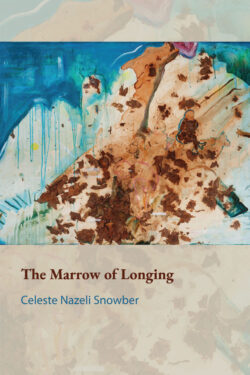 Probably the most comforting honorific is the Jewish, “May their memory be a blessing,” the reverse of which is, “…and may the wicked perish.” The context for Snowber, a poet who dances through time, is her invisible Armenian heritage. Armenia is no more and Turkey is committed to the international world order, survival of the fittest.
Probably the most comforting honorific is the Jewish, “May their memory be a blessing,” the reverse of which is, “…and may the wicked perish.” The context for Snowber, a poet who dances through time, is her invisible Armenian heritage. Armenia is no more and Turkey is committed to the international world order, survival of the fittest.
The word “genocide” is freely thrown around in the time of plague as we all scramble for the seeds that will provide new life in the post-pandemic world. Jews, African Americans, Armenians, and Indigenous people around the world are awakening to the possibility of a new world order, one based on justice for all.
There is a recipe for survival and it is a creature comfort, the food that grows in ancient terroir, the compost of our ancestors.
As a dancer, Snowber, whose American parents were immigrants from Ireland and Armenia, knows her body and the genetic cues that trigger longing. They are in her mother of blessed memory’s kitchen, the familiarity that has survived brutal annihilation, starvation and translation from home to hotel, the uncomfortable melting pot.

Like crabs in hot water, immigrants slowly rise to the boil and the soul leaps out intact, sometimes speaking the language of poetry.
This longing moves from noun to verb as she assures us of her immortal soul moving through generations with its story intact.
In the cracks of life
Lies the crucible
Of the divine
Her oral tradition, recipe and prayer, pass down as she recalls
There was no cookbook
in the old country
food was a dialect they spoke
to cook for those you love
the recipe is passed down
from tongue to tongue
heart to tongue
She might be telling those of us who have visited the lands of our ancestors and experienced recognition of places the heart remembers that this is the way oppressed people transform tragedy, not by invention but by reinvention. “They buried us, but we were seeds.”
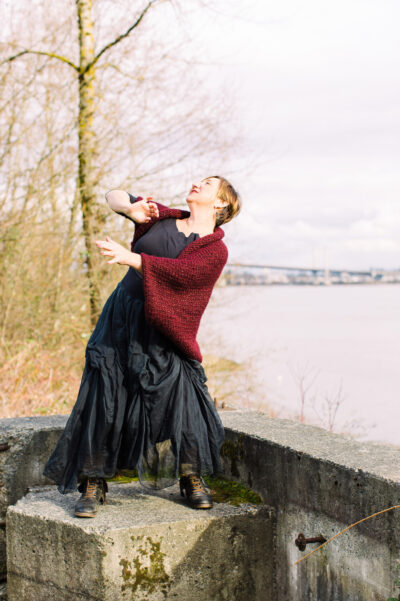
As we emerge from global quarantine, we too might be guided by the heart back to the roots of the Mother Trees that hold down the land that is our ultimate comfort, the blessed memories, as we reconnect to old root systems that go all the way back to the First Garden, before violent men, what became the patriarchy and ultimately the neo-conservatism choking our world garden, not just from places we long for, food we remember, but from ourselves.
Sometimes we call little children “old souls.” They seem to know. This is what Snowber brings from her own childhood, with maps of the heart transcribed by illustrator Marsha Nouritza Odabashion, who transcribes her own genetic information in natural plant based dyes, the simple revelatory onion for example. “We are ancestral tones” she tells us and relates a story from her past.
I’m lying in the back seat
of the turquoise poly-green Chevy
sprawled across vinyl upholstery
in a no seat-belt era
I’m singing and humming sounds
I’d never heard.
Indigo children might be maps to the shining city on the hill, a return to innocence. We hold our breath and wait to find out if this kind of unpretentious storytelling can carry us, body and soul, back to the future. This is the sacrament of the familiar.
*
Step 8. Reflection
Outlasting the Weather: Selected & New Poems 1994-2020
by Patrick Friesen
Vancouver: Anvil Press, 2020
$20.00 / 9781772141535
 I once watched the poet read with his hand cupping his ear, the way singers tune in to themselves. This method of decoding sound is called bone conduction and it is, for our purposes, the head sound of his selected and new poems.
I once watched the poet read with his hand cupping his ear, the way singers tune in to themselves. This method of decoding sound is called bone conduction and it is, for our purposes, the head sound of his selected and new poems.
What matters happens where you sit with your elbows on the
table your feet on the floor
the conversation that rattles through your head all night and
leaves you worn in the morning
Once again, sound, the circular breath moves through sentence, stanza and poem, one to the next, uninterrupted by punctuation and the reader is left having experienced something as undefined as wind, his figures moving in and out, perhaps whispering, the story of no story, just a life of sensation, now
and further back
where the seasons run together
my grandparents
ten thousand years ago
them walking across
the world
always moving always
on their way to water
and water always
on its way
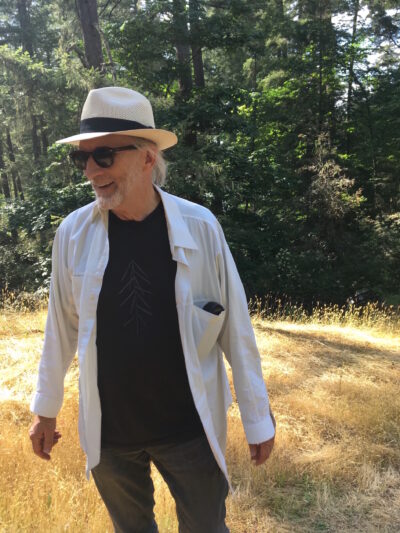
This has been the season of meditation and flashback as we reflect on the flow of wind and water through our lives until the moment stretched into weeks and months and years in slow motion, all the voices underwater, indistinct, inconsonant. It is not directed poetry as we look to the future uncertain, another book title.
Water is his chief protagonist, his dear companion, its slow moan resistant to full stops and consonants.
(crazy) looks at her hands
turning them over
and here she taps her head
there are free thoughts
crazy watches light grow dim
and night moving in
It is as if all thought, all movement is involuntary, night and day circling through the mind in the sky. Having renounced free will and given all power to the system of governance that gives the power to plague and pestilence, we are a passive species waiting for the universe to produce miracles: cure for viral plague and the man plagues, an empathy deficit, as he describes watching his dying father,” a roomful of nerves, waiting on the afterlife.”
Cogito ergo sum. Perhaps thinking is being after all, beings outlasting mimed concerti and getting up to move to music that “was familiar only no one had written it.” This is how it feels to live in the ante room to nothing more, where gulls bring warnings, prophecy, maybe even luck, “and what passes through us shall descend on your streets and your heads, they scatted. Absolutely the King James version.”
There is no such a thing as perfect translation. Just as bees swam and the poet’s Mennonite ancestors, who rejected iconography, the headstones and statues that are for many the songlines that show us the way home, swarmed the flat prairie, so do his words sting and nourish. That is the map that dwells in the mind even of a poet who broke his covenant with those ancestors. It is muscle memory that outlasts weather, but not the wind.
*
Step 9. Praying for Rain, Hygiene Theatre
A History of the Theories of Rain
by Stephen Collis
Vancouver: Talonbooks, 2021
$16.95 / 9781772012880
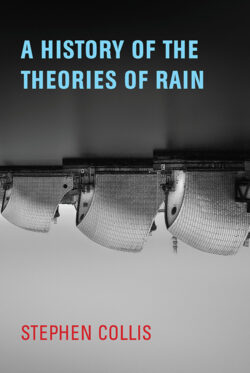 Now, even urban dwellers are as conscious as farmers of the changing seasons, the possibility of renewal even as we face the consequences of our reckless conservancy of the planet.
Now, even urban dwellers are as conscious as farmers of the changing seasons, the possibility of renewal even as we face the consequences of our reckless conservancy of the planet.
We were relieved when the first spring after lockdown was announced by green leaves and singing birds, showers that woke up and refreshed the sleeping land with familiar rhythms and we comforted ourselves by washing everything.
Pandemic poets have found different ways to water the garden with tears, their waves sweeping the beaches of our consciousness.
I cannot stop
asking the news
no longer news

Stephen Collis reminds us of the consequences of homocentric thinking in a world that depends on diversity, every species part of the healthy organism. The horse is out of the barn and, sharing a metaphor with several poets in this garden of earthly prescriptions, paints a chilling picture of human guilt.
The light still
might be fading
the skinless horses
trampling ill-fed
at borders and
the barn a
gaping hole in
what can and
cannot be
said
These are spare poems, bare truth and when he ventures into metaphor it may be that he wants us to know the burden of expectation. Nothing is fully beautiful when we have the power to ruin it. So he delivers the unlyric possibility of eyes unburdened by tears, usually the panacea for pain, the stuck lash, the aggressive possibility that is fear.
another downpour
ownturn or
the bottom falling out of
the buckets between our eyes
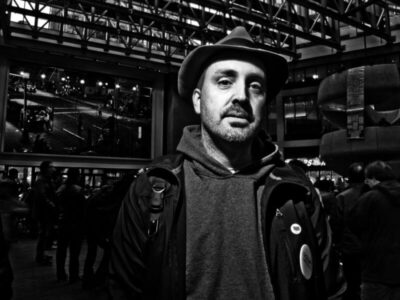
Well yes, that is a groan on the scale of an awkward pun, but it resonates like the sound of metal landing on concrete. This is not lyric poetry. It is Cassandra home from the Senate, her voice used up in warnings. She knows.
The past was imperfect, the present is imperfect and so is the future. No naïve idealism lurks in the words carefully chosen by Collis, who warns us that every step is a risk, even rain carrying the toxic payload of Fukishima. What fools these mortals be.
Even so, he is aware of the beauty in the ruin and the rain and that is merciful. As he records the
collapse of intricate order
winging now into night
as the cellos soar and
the possibility of song remains
without words to smother it
We are required to return to the grass growing over battlefields. In the pause, we still consider promise. However, “I’m not actually sure where the exit is. Or how long the grass has grown.”
This poet finds comfort in collegiality. He has not grown as cynical as those who back off the conversation when the toxicity of the neo-liberal system infects our sullen art with the deadly sins of vanity and jealousy. There is nothing more lonely that a poet with no one to talk to. Even the solo raindrop needs companionship.
*
Step 10. Home
Here
by Colin Browne
Vancouver: Talonbooks: 2020
$19.95 / 9781772012644
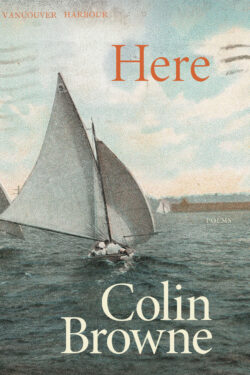 For it is the business of a man gifted in the word to prophecy good. — Christopher Smart
For it is the business of a man gifted in the word to prophecy good. — Christopher Smart
The treasure box of prophecy is history, knowledge stored for sharing, to be opened at the precise time when it is necessary to transform sorrow and loss into doves that will fly out and return with olive branches gripped in their beaks.
I bound my liver
to the prophecies
until here was here
and set about
the exterminations
What is to be exterminated now on the occasion of the discovery of 215 little bodies in the nuisance ground at a residential prison for children? That is so much history, whispered but never fully revealed, that Colin Browne in his catalogue of earthly sins that must be named and accounted for before “the invisible work resumes.”
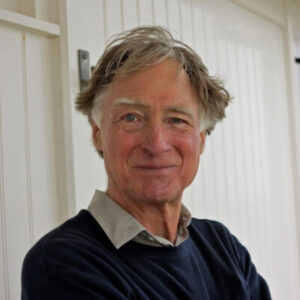
I sow words
in this furrow
thinking to braid
love into the world.
There is no “here” without an understanding of how we got here and Browne takes the gull’s eye view of history ceding, receding, proceeding as he defines optimism step by step, calling on his examination of the past to imagine the future. The pages of his book are the skins of the many, worn, repaired restored so that the coat of many colours is his legacy, not just the examination of his own disposable garment, or the view from his position of privilege.
we stay on
our side
of the street
these are
the protocols
of occupation

“Maps are prelude to the occupation,” the poet argues, drawing his own litany of blessings, a catalogue not of arrogance, but intention to utilize the treasures of his own inheritance to chart the route home, where we all belong.
Knowing, or the ripple of vanishing, half lucid impressions
we think of as knowing, is analogous to skipping stones on
a bell of water. The surface lifts and moves outward, rising
to meet the sun. And the peonies this morning, opening wide.
I is multiple, sans fin.
This is home, the recipe for a cure, poetry that takes us through peril, the romantic journey of many tests that carries us through all kinds of weather to a safe harbour in the heart, where all are welcome. Home, with perfectly satisfying songs in our beaks.
*
A Poem of Poems
Eat(ing) salt with the wig
maker, strangers gaze at the
ocean, the language we were
never taught to speak, the
marrow of longing outlasting
the weather. Here, Pandemic,
a history of the theories of rain. — Linda Rogers
*
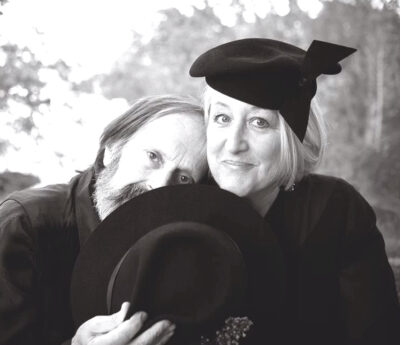
Linda Rogers knows all about the efficacy of poetry that passes as prayer, curse, spell and poultice, and has noticed that poems are springing up like mushrooms in pandemic compost. Whatever works! Without poems it would have been worse. Linda Rogers’ Empress Trilogy is now complete with the publication of Repairing the Hive (Ekstasis). Studio 123 is about to print her pandemic collection, Mother, the Verb, the Swan Sister Treasure Book, the stories of activist artists. Editor’s note: Linda Rogers has also reviewed books by Heidi Greco, Liv Albert, Amanda Hale (Mad Hatter), Howard White, Eufemia Fantetti, Patricia Demers, and Amanda Hale (Angela of the Stones) for The Ormsby Review. Her book Crow Jazz (Mother Tongue Publishing, 2018) was reviewed by Paul Headrick.
*
The Ormsby Review. More Books. More Reviews. More Often.
Publisher and Editor: Richard Mackie
The Ormsby Review is a journal service for in-depth coverage of B.C. books and authors. The Advisory Board consists of Jean Barman, Wade Davis, Robin Fisher, Cole Harris, Hugh Johnston, Patricia Roy, Maria Tippett, and Graeme Wynn. Scholarly Patron: SFU Graduate Liberal Studies. Honorary Patron: Yosef Wosk. Provincial Government Patron since September 2018: Creative BC
“Only connect.” – E.M. Forster
8 comments on “1163 Eleven poets from a plague year”
Highly intelligent. Most appreciated.
what a gorgeous review/essay. Thank you, Linda